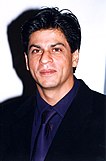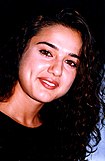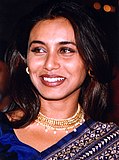Shah Rukh Khan, Preity Zinta, and Rani Mukerji even garnered several accolades for their performance in Veer-Zaara. | |||||||||||||||||||||||||||||||||||
| |||||||||||||||||||||||||||||||||||
| Totals[a] | |||||||||||||||||||||||||||||||||||
|---|---|---|---|---|---|---|---|---|---|---|---|---|---|---|---|---|---|---|---|---|---|---|---|---|---|---|---|---|---|---|---|---|---|---|---|
| Wins | 34 | ||||||||||||||||||||||||||||||||||
| Nominations | 92 | ||||||||||||||||||||||||||||||||||
Note
| |||||||||||||||||||||||||||||||||||
Veer-Zaara is a 2004 Indian Hindi-language romantic drama film directed by Yash Chopra and written by Aditya Chopra.[1] The film stars Shah Rukh Khan, Preity Zinta, and Rani Mukerji, while Manoj Bajpayee, Amitabh Bachchan, Hema Malini, Boman Irani, Kirron Kher, Divya Dutta, and Anupam Kher form the supporting cast.[2] Set against the background of India–Pakistan relations, it focuses on the titular star-crossed lovers—Veer Pratap Singh (Khan), an Indian Air Force pilot, and Zaara Hayaat Khan (Zinta), a Pakistani woman—whose love story spans across two decades amid trials and tribulations and the young lawyer Saamiya Siddiqui (Mukerji) who tries to help the couple.[1][3] The soundtrack of Veer-Zaara is based on music by Madan Mohan, which was later revised by his son Sanjeev Kohli.[4] The film was shot by Anil Mehta on sets that were designed by Sharmishta Roy and was edited by Ritesh Soni.[2]
Filmed on a production cost of ₹180 million (US$2.2 million),[5] it premiered on 12 November 2004 and received widespread critical acclaim.[1][6] A major commercial success, the film emerged as India's highest-grossing film of the year, earning ₹976.4 million (US$12 million) in both India and abroad.[6] The British academic Rachel Dwyer of the British Film Institute included the film in her "10 Great Bollywood Romance Films" listing.[7][8] The film won 34 awards out of 92 nominations; the story, screenplay direction, performances of the cast, soundtrack, and the lyrical composition garnered the most attention from various award groups.
Veer-Zaara won the Best Popular Film Providing Wholesome Entertainment at the 52nd National Film Awards. It was nominated in fifteen categories at the 50th Filmfare Awards, including Best Director (Yash Chopra), Best Actor (Khan), Best Actress (Zinta), Best Supporting Actor (Amitabh Bachchan), and two nominations for Best Supporting Actress (Dutta and Mukerji), and won four including Best Film. In the sixth iteration of the International Indian Film Academy Awards, the film received seven awards including Best Film, Best Director for Chopra, Best Actor for Khan, and Best Supporting Actress for Mukerji. Veer-Zaara also earned two Global Indian Film Awards, one Producers Guild Film Award, five Screen Awards, two Stardust Awards, and four Zee Cine Awards.
- ^ a b c Salam, Ziya Us (14 November 2004). "Winner all the way". The Hindu. Archived from the original on 17 June 2021. Retrieved 15 June 2021.
- ^ a b "Veer-Zaara Cast & Crew". Bollywood Hungama. Archived from the original on 2 September 2011. Retrieved 24 August 2021.
- ^ Adarsh, Taran (12 November 2004). "Veer-Zaara: Movie Review". Bollywood Hungama. Archived from the original on 9 September 2011. Retrieved 24 August 2021.
- ^ Mahaan, Deepak (24 June 2011). "Madan and melody". The Hindu. Archived from the original on 24 August 2021. Retrieved 24 August 2021.
- ^ Nag, Ashoke (2 December 2004). "Diwali releases fail to light up box office". The Economic Times. Times News Network. Archived from the original on 4 November 2020. Retrieved 25 August 2021.
- ^ a b "Top Worldwide Grossers 2004". Box Office India. Archived from the original on 25 December 2018. Retrieved 25 August 2021.
- ^ Dwyer, Rachel (11 December 2015). "10 great Bollywood romance films". British Film Institute. Archived from the original on 22 July 2016. Retrieved 25 August 2021.
- ^ "Veer-Zaara 2004". Metacritic. Archived from the original on 28 June 2020. Retrieved 25 August 2021.


